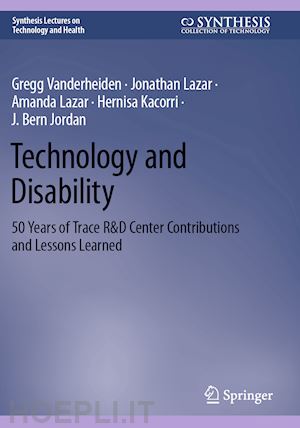
Questo prodotto usufruisce delle SPEDIZIONI GRATIS
selezionando l'opzione Corriere Veloce in fase di ordine.
Pagabile anche con Carta della cultura giovani e del merito, 18App Bonus Cultura e Carta del Docente
This book outlines the development of the Trace R&D Center as an institution for furthering accessible and assistive technologies. The book walks readers through the Center’s nascent attempts to solve individual challenges with augmentative communication devices through contemporary efforts to establish global frameworks and infrastructures for accessibility. This book is premised on the Center’s mission to maximize the potential of people with disabilities by harnessing evolving technologies while at the same time dismantling the barriers created by those same technological advancements. Readers will learn how this has been done in the past and why this practice should be a fundamental and integrated feature in new technology planning and implementation. The book touches on pre-internet technologies before exploring the huge implications of, first, the personal computer and, second, the Internet. In parallel with the massive growth in scale rendered by the launch of the Web, the book traces the expansion of the Center’s focus from the individual to the universal, particularly in working to establish accessibility standards and infrastructures. Learning from the successes and failures of the Center, the book outlines many past challenges and future directions for the development of technologies for people with disabilities from the research and industry perspectives.
Jonathan Lazar, Ph.D., LLM is a professor in the College of Information Studies (iSchool) at the University of Maryland. Professor Lazar has authored or edited 14 books, including Accessible Technology and the Developing World (co-edited with Michael Stein), Research Methods in Human-Computer Interaction (2nd edition, co-authored with Heidi Feng and Harry Hochheiser), Ensuring Digital Accessibility Through Process and Policy (co-authored with Dan Goldstein and Anne Taylor), Disability, Human Rights, and Information Technology (co-edited with Michael Stein), Universal Usability: Designing Computer Interfaces for Diverse User Populations, and Web Usability: A User-Centered Design Approach. Professor Lazar has published over 150 refereed articles in journals, conference proceedings, and edited books, frequently serves as an adviser to U.S. government agencies, regularly provides testimony at the federal and state levels, and multiple U.S. federal regulations cite his research. At the University of Maryland iSchool, he teaches courses on human-computer interaction, user-centered design, accessibility, and legal research methods. He is the recipient of the 2021 ACM SIGCHI Academy Award, the 2020 ACM SIGACCESS Award for Outstanding Contributions to Computing and Accessibility, the 2017 University System of Maryland Board of Regents Faculty Award for Excellence in Research, and the 2016 ACM SIGCHI Social Impact Award. Dr. Lazar recently served as the general chair of the ACM ASSETS 2021 conference. At the University of Maryland, Dr. Lazar is a faculty member in the Human-Computer Interaction Lab (HCIL) and was recently appointed as the director of the Trace Research and Development Center, the nation’s oldest research center on technology and disability.
Amanda Lazar is an assistant professor in the College of Information Studies with an affiliate appointment in the Department of Computer Science at the University of Maryland, College Park. She received her Ph.D. in Biomedical and Health Informatics. Her research in Human Computer Interaction examines the design of technology for older adults as well as individuals with dementia to support social interaction and engagement in life. In parallel, she examines the ways that technologies shape (and are shaped by) attitudes towards these populations. Amanda’s research draws on the health sciences as well as critical frameworks. She regularly publishes her research with her students at conferences such as the ACM CHI Conference on Human Factors in Computing Systems (CHI) and Computer Supported Cooperative Work and Social Computing (CSCW). Her research group has received multiple Best Paper and Honorable Mention awards. Amanda’s work is supported by a CAREER grant from the National Science Foundation (NSF), as well as other grants from the NSF and the National Institute on Disability, Independent Living, and Rehabilitation Research (NIDILRR).
Hernisa Kacorri is an assistant professor in the College of Information Studies. She holds an affiliate appointment in the Department of Computer Science and the Human-Computer Interaction Lab at the University of Maryland, College Park and serves as a core faculty at the Trace R&D Center. She received her Ph.D. in Computer Science from The Graduate Center at City University of New York, and has conducted research at the University of Athens, IBM Research-Tokyo, Lawrence Berkeley National Lab, and Carnegie Mellon University. Her research focuses on accessibility and human-centered artificial intelligence, with











Il sito utilizza cookie ed altri strumenti di tracciamento che raccolgono informazioni dal dispositivo dell’utente. Oltre ai cookie tecnici ed analitici aggregati, strettamente necessari per il funzionamento di questo sito web, previo consenso dell’utente possono essere installati cookie di profilazione e marketing e cookie dei social media. Cliccando su “Accetto tutti i cookie” saranno attivate tutte le categorie di cookie. Per accettare solo deterninate categorie di cookie, cliccare invece su “Impostazioni cookie”. Chiudendo il banner o continuando a navigare saranno installati solo cookie tecnici. Per maggiori dettagli, consultare la Cookie Policy.